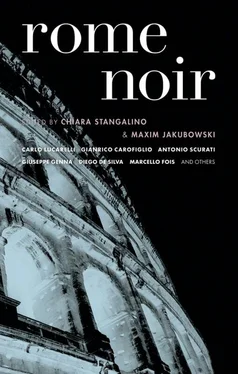Джанрико Карофильо - Rome Noir
Здесь есть возможность читать онлайн «Джанрико Карофильо - Rome Noir» весь текст электронной книги совершенно бесплатно (целиком полную версию без сокращений). В некоторых случаях можно слушать аудио, скачать через торрент в формате fb2 и присутствует краткое содержание. Город: New York, Год выпуска: 2009, ISBN: 2009, Издательство: Akashic Books, Жанр: Детектив, на английском языке. Описание произведения, (предисловие) а так же отзывы посетителей доступны на портале библиотеки ЛибКат.
- Название:Rome Noir
- Автор:
- Издательство:Akashic Books
- Жанр:
- Год:2009
- Город:New York
- ISBN:978-1-933354-64-4
- Рейтинг книги:3 / 5. Голосов: 1
-
Избранное:Добавить в избранное
- Отзывы:
-
Ваша оценка:
- 60
- 1
- 2
- 3
- 4
- 5
Rome Noir: краткое содержание, описание и аннотация
Предлагаем к чтению аннотацию, описание, краткое содержание или предисловие (зависит от того, что написал сам автор книги «Rome Noir»). Если вы не нашли необходимую информацию о книге — напишите в комментариях, мы постараемся отыскать её.
Rome Noir — читать онлайн бесплатно полную книгу (весь текст) целиком
Ниже представлен текст книги, разбитый по страницам. Система сохранения места последней прочитанной страницы, позволяет с удобством читать онлайн бесплатно книгу «Rome Noir», без необходимости каждый раз заново искать на чём Вы остановились. Поставьте закладку, и сможете в любой момент перейти на страницу, на которой закончили чтение.
Интервал:
Закладка:
Rome, from then on, became the fixed destination of my vacations. As soon as I have a few days, I get on a plane and fly to Italy. Every so often, it happens that I can stay for a week, and then I manage to see Giulia two or three times. More often, they are whirlwind holidays: I leave at night from New York, arrive in Rome early the next morning, stay a day and a night, leave the following morning: a weekend in all, including the nine hours in the plane to get there and the same coming back. But it almost never happens that my Roman weekend coincides with an actual weekend. In fact, on Saturday and Sunday she has to be home, except for one weekend a month, when it’s her turn in the office, and so she’s just as busy. On some pretext, she can take a day off during the week as compensation, and devote it to me. Usually we see each other a couple of times a month. It works like this. I arrive and take a double room at a luxury hotel: the Hassler on Trinità dei Monti, the Hotel de Russie on Via del Babuino, the Plaza on Via del Corso, the Raphael near the Pantheon, the Excelsior on Via Veneto: These are my favorites. I earn a good living, enough to afford them, and besides, I love five-star hotels: They’re the only luxury I indulge in. But in this case I choose them for other reasons. They’re in the center, first of all, and Giulia lives in a residential neighborhood in the south of Rome, so it’s less likely that she’ll meet someone she knows. Furthermore, in these hotels the doormen are worldly, used to looking the other way in exchange for a generous tip, if in the late morning a woman accompanies a guest to his room without presenting her documents, as is usually required in Italy. Thus I spare her the embarrassment of disclosing her identity, of leaving traces. Finally, since we spend most of our time together in the room, I like it to be large, comfortable, elegant. I always wait for her in a café near the chosen hotel. When I see her coming, I get up and pay the bill, and she follows me, like a stranger, brushing my hand, pausing to give me a kiss in the doorway of a building, then immediately starting to walk again. Arriving at the hotel, we begin kissing in the elevator, start again as soon as I’ve closed the door of the room, and almost never stop. We take off our clothes quickly, we fall into bed, we make love — in every possible way — until evening. Maybe we fill the bathtub and spend awhile there. Sometimes we have room service: When the waiter comes in with the table, she goes into the bathroom, even though it’s obvious, from what we order, from the unmade bed, and from the Do not disturb sign hanging on the door, that there are two people in the room. Sometimes, at night, we have dinner in a tourist trattoria in the neighborhood between the Pantheon and Piazza del Popolo. Rome is full of these trattorias; they are places where no Roman would ever eat and so there, too, the risk of running into someone who might recognize her is not so high. It’s a system that guarantees eating badly, or at least not especially well, but it’s not the food that interests me. For Giulia and me, it’s enough to sit together in a dark corner, our knees touching, hands seeking each other under the table, letting ourselves be dazed by wine, only to hurry back to the room as soon as we’ve finished eating.
There have been exceptions to the rule of these encounters in the two years since we’ve been seeing each other. Once we went together to the Sistine Chapel, she hidden under a scarf and a pair of big dark sunglasses — well camouflaged among the legions of foreign tourists. Another time we took a car and went to Fregene, out of season, to stroll on the beach. It was sunny, we tumbled among the dunes. We also went to the movies one afternoon, not for the film but for the excitement of finding ourselves in the dark, in a half-empty theater, doing everything that is forbidden. Occasionally, I climb up behind her on her motor scooter and she drives me around, with no set destination: Since we’re wearing helmets we’re both unrecognizable. And since so many Romans travel around the city the same way — two wheels are the only alternative to the slow pace of cars and the inevitable traffic jams, Giulia explained. Protected by the mask of the helmet, holding onto her, I traverse the Eternal City like an invisible man to whom all is granted.
But it is in bed that we spend most of our time together. Partly we stay in these hotel rooms because ours is an illicit, clandestine love, which can’t be lived in front of others. The main reason, though, is that we like it. However nice it is to eat together, walk together, go somewhere together, nothing seems better to us than staying in bed together. I’ve never felt anything like that. I’ve had other women who excited me, but I’ve never spent eight, ten, fifteen hours in bed with one of them — at a certain point, desire always ran out. With Giulia it’s different: It never ends. Even if I’m tired after we’ve made love for a long time, an electric current impels me to caress her butt, lick the inside of her thighs, kiss her mouth, trace the line of her teeth with a finger, bite her ear, and on and on, without stopping. I can never have enough of her. It’s like a universal truth that was suddenly revealed to me: For the first time it seems obvious, as it never had before, that things should always be this way between a man and woman who are in love. That or nothing. No half-measures. The idea that a couple can lie together, I don’t mean for ten minutes but for an hour or two, and that each prefers to read a book, watch television, sleep — that is, do something else — now seems inconceivable, sad, wrong. If two people are in love, if they want each other, love should be the way the two of us live it: uncontainable. Morbid. A disease. Now I believe that the moment this passes and excitement turns into routine, love starts to end. Rather, it’s already over.
Eventually, however, a worm began digging a hole in my obsession with Giulia, very tiny at first, then larger and larger: the thought of her husband. I’m a free man, without ties; I could be with her, if we wanted, all the time. And I would like it to be all the time. But Giulia isn’t free; she’s a married woman. For months, after that first meeting at Villa Borghese when I said that I saw in her a neglected and unhappy wife, we never returned to my mistake. Besides, it seemed to me that the facts expressed our wish to be together. Mistake or not, I thought I had understood everything: Giulia and her husband were the typical couple who married very young, but after twenty years things had cooled. As an explanation it suited me. I had no doubts, residual questions, uncertainties. But the worm, quietly, slowly, continued to dig. The hole got bigger. And I fell into it. I had to admit to myself that the classic roles of the triangle were reversed: I, the lover, was jealous of the husband. Of course, every so often Giulia mentioned his egotism, the fact that he never listened to her or that he dumped on her shoulders as wife and working mother all the responsibilities for the house and the children. But she said it as a simple fact, without much complaint, without expecting to change him or the situation. Of him she never spoke with malice, never.
Now Giulia had someone to listen to her: me. As in our first conversation flying over the Atlantic, it was always she who did more of the talking, telling me an infinity of stories great and small, about the articles she commissioned or wrote for the paper, about the minor incidents of life in the office, petty feuds, jealousies, injustices, the confidences of friends, the problems or successes she had with her children, the things she bought for the house, the vegetables she got at the market, the delicious meals she cooked. There — that’s where my uneasiness made itself felt for the first time, I remember clearly, at the table. One of those evenings when Giulia couldn’t stay with me, but had to hurry home at dinnertime — breathless, in her constant struggle with time — as if she were coming from the newspaper. Suddenly, as I was eating dinner alone in a squalid pizzeria, I saw her at the stove, preparing food for her family, and then at the table, laughing with her children, telling her husband something, receiving compliments from them all for the wonderful meal she had made. I felt a pang of jealousy. From that day, I began to desire Giulia not only in bed. I began to want to share with her the little rituals of daily life: dinner with friends, an outing with the children, a vacation, shopping at the supermarket. I thought how, in all those situations, it was the husband who got to be close to her, who enjoyed her presence continuously: not me. And I wondered how she really was with that man. I wondered if, and when, and how, they made love: odd, I had never thought about this before. Giulia talked so much, she told me so many things, but about him, and what she really felt, she said little. Was it reserve, a need to protect the privacy of her marital relations? Or perhaps only timidity, a difficulty in opening up? I then realized that she had rarely said to me, “I love you,” “I adore you,” phrases typical of lovers. It seemed to me that I could see love in the way she looked at me, but she measured her words, as if she distrusted them. She was much freer with text messages. She wrote: What are you doing to me? I’m yours more and more, I miss you, I want you, I think of you, dream of you, you’re inside me, part of my life. And yet when, having received the message, I called her, I had the sensation that it was a different person who had sent it, that she was retreating, that she no longer wanted to talk about it. And the worm, planted inside me, kept on working. I would have liked to ask her: You, what do you really feel? What is the difference between me and your husband? Would you leave him if I asked you to? How would you react if I asked you, for example, to marry me? Would you run away with me to New York? Or, if I moved to Rome, would we live together? But I couldn’t: It was stronger than me: I couldn’t. These were the sort of questions that, the other way around, women had always asked me, in the various relationships I’d had. Relationships without love. Relationships in which I listened to those plaintive questions — What about you, what do you feel? Do you love me? Do you care for me, think of me? — with an increasing sensation of nausea. With the wish to silence their mouths, flee, never see them again.
Читать дальшеИнтервал:
Закладка:
Похожие книги на «Rome Noir»
Представляем Вашему вниманию похожие книги на «Rome Noir» списком для выбора. Мы отобрали схожую по названию и смыслу литературу в надежде предоставить читателям больше вариантов отыскать новые, интересные, ещё непрочитанные произведения.
Обсуждение, отзывы о книге «Rome Noir» и просто собственные мнения читателей. Оставьте ваши комментарии, напишите, что Вы думаете о произведении, его смысле или главных героях. Укажите что конкретно понравилось, а что нет, и почему Вы так считаете.












